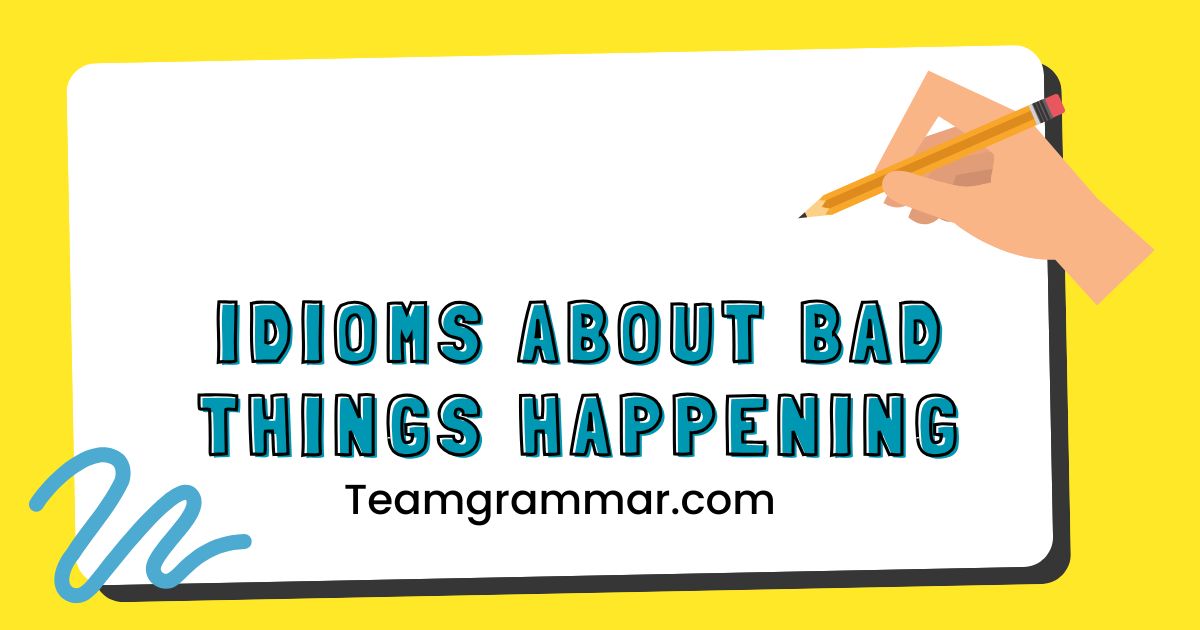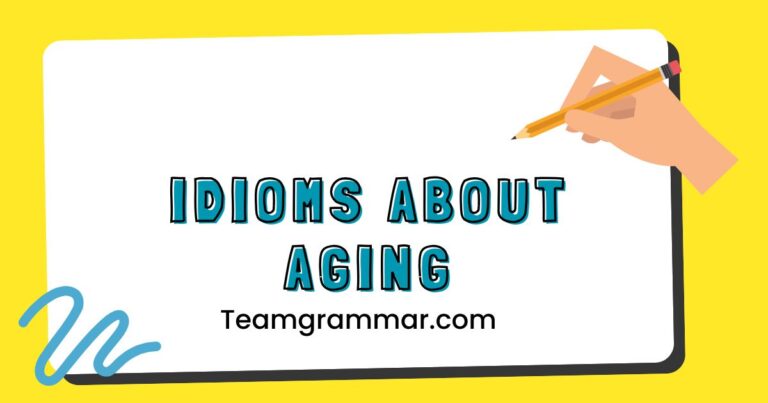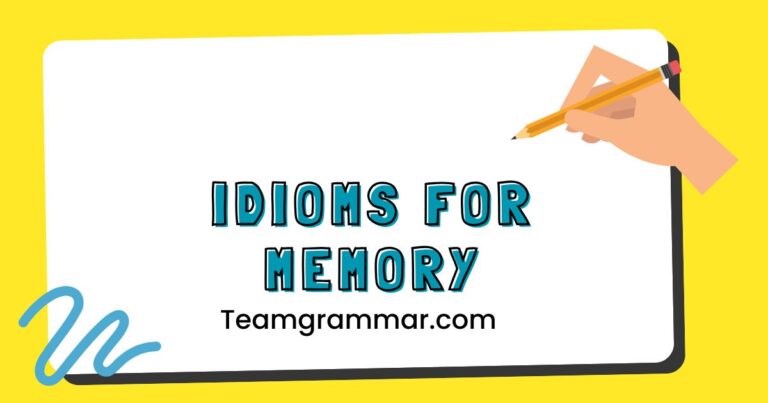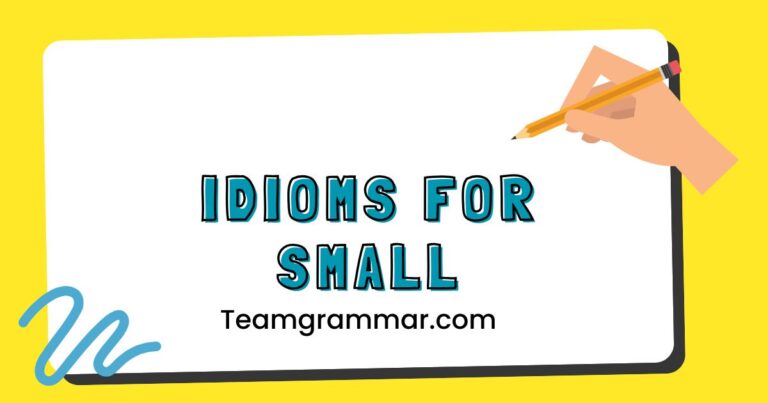49 Idioms About Bad Things Happening: A Comprehensive Guide
Idioms add color and depth to the English language, allowing speakers to express complex ideas with vivid imagery. Understanding idioms, especially those related to negative events, is crucial for comprehending nuanced conversations and written texts.
This article delves into a wide array of idioms that describe misfortune, setbacks, and unpleasant situations. Whether you’re an English language learner or a native speaker looking to enrich your vocabulary, this guide will provide valuable insights and practical examples to help you master these expressive phrases.
Table of Contents
- Introduction
- Definition of Idioms About Bad Things Happening
- Structural Breakdown of Idioms
- Types and Categories of Idioms
- Examples of Idioms About Bad Things Happening
- Usage Rules for Idioms
- Common Mistakes When Using Idioms
- Practice Exercises
- Advanced Topics in Idiom Usage
- Frequently Asked Questions
- Conclusion
Definition of Idioms About Bad Things Happening
Anidiomis a phrase or expression whose meaning cannot be understood from the ordinary meanings of the words within it. Instead, the phrase has a figurative meaning known conventionally by native speakers.
Idioms related to bad things happening are used to describe unfortunate events, difficulties, failures, or negative situations in a more colorful and expressive way than straightforward language allows. These idioms add emotional weight and cultural context to communication.
These idioms often serve to soften the blow of bad news or to add a layer of irony or humor to a difficult situation. They can also provide a sense of shared understanding and empathy between speakers, as they often draw upon common experiences and cultural references.
The function of these idioms is not just to describe a negative event, but also to convey the speaker’s attitude towards it.
The contexts in which these idioms are used are vast, ranging from casual conversations to formal writing. However, it’s important to consider the audience and the situation before using an idiom, as some may be considered too informal or inappropriate for certain settings.
Understanding the nuances of idiom usage is crucial for effective communication in English.
Structural Breakdown of Idioms
Idioms, by definition, defy simple structural analysis. Their meaning is not derived from the sum of their parts, but rather from a conventional understanding.
However, some patterns can be observed in their construction.
Many idioms follow common grammatical structures, such as subject-verb-object or prepositional phrases. The key is that the words within the idiom do not retain their literal meanings.
For instance, in the idiom “hit the roof,” the verb “hit” and the noun “roof” do not refer to a physical action; instead, the phrase means “to become very angry.”
Some idioms contain archaic words or grammatical constructions that are no longer in common use. This can make them particularly challenging for non-native speakers to understand.
Additionally, idioms may vary slightly in their wording depending on the region or dialect of English being spoken.
The table below illustrates the structural components of a few idioms related to bad things happening.
| Idiom | Structural Components | Literal Meaning | Figurative Meaning |
|---|---|---|---|
| When it rains, it pours. | Subject-Verb-Object | Rain falls heavily. | Bad things tend to happen all at once. |
| Add insult to injury. | Verb-Object + Preposition + Noun | To make an injury worse by insulting someone. | To worsen an unfavorable situation. |
| Go down in flames. | Verb + Preposition + Noun | To be destroyed by fire. | To fail spectacularly. |
| Bite the dust. | Verb + Object | To bite the small particles on the ground. | To die or fail. |
| Miss the boat. | Verb + Object | To not catch a means of transportation. | To miss an opportunity. |
Types and Categories of Idioms
Idioms about bad things happening can be categorized based on the themes or imagery they employ. Here are some common categories:
Weather-Related Idioms
These idioms use weather metaphors to describe negative situations. Weather is often unpredictable and can cause disruption, making it a fitting analogy for unforeseen problems.
Animal-Related Idioms
Animals are often used to represent certain characteristics or behaviors. Animal idioms related to bad things happening often invoke images of vulnerability, danger, or unpleasantness.
Body-Related Idioms
These idioms use parts of the body to describe experiences of pain, discomfort, or failure. They can convey both physical and emotional distress.
War-Related Idioms
War is inherently destructive and chaotic. War idioms often describe situations of conflict, defeat, or significant loss.
Luck-Related Idioms
These idioms directly address the concept of bad luck or misfortune. They often imply a sense of helplessness or inevitability.
Examples of Idioms About Bad Things Happening
The following sections provide examples of idioms categorized by their themes, helping to illustrate their diverse applications and meanings.
Weather Idioms Examples
Weather idioms provide powerful imagery to describe tough times. The table below lists various weather-related idioms, their meanings, and example sentences.
| Idiom | Meaning | Example Sentence |
|---|---|---|
| When it rains, it pours. | Bad things tend to happen all at once. | First, I lost my job, and then my car broke down. When it rains, it pours. |
| A storm is brewing. | Trouble is on the horizon. | The tense atmosphere in the office suggests a storm is brewing. |
| Come rain or shine. | No matter what happens. | I’ll be there for you, come rain or shine. |
| Every cloud has a silver lining. | There’s something good in every bad situation. | Losing my job was tough, but every cloud has a silver lining – I’m starting my own business. |
| Under the weather. | Feeling unwell. | I’m feeling a bit under the weather today, so I’m staying home. |
| Weather the storm. | Survive a difficult period. | The company weathered the storm of the recession and emerged stronger. |
| Clear the air. | Resolve a conflict or misunderstanding. | We need to clear the air after that argument. |
| In the eye of the storm. | In the middle of a chaotic situation. | As the manager, he was in the eye of the storm during the crisis. |
| A bolt from the blue. | Something unexpected and shocking. | The news of her resignation was a bolt from the blue. |
| Chasing rainbows. | Pursuing unrealistic goals. | He’s chasing rainbows if he thinks he can become a millionaire overnight. |
| Have your head in the clouds. | To be out of touch with reality. | She has her head in the clouds if she thinks she will pass the exam without studying. |
| A fair-weather friend. | Someone who is only there when things are good. | He proved to be a fair-weather friend when I needed him most. |
| Make hay while the sun shines. | Take advantage of a good opportunity. | We need to make hay while the sun shines and get this project finished. |
| On cloud nine. | Extremely happy (often used ironically in the context of bad things happening). | He was on cloud nine until he received the bad news. |
| Rough seas. | Difficult times. | The company is navigating rough seas due to the economic downturn. |
| Soaking up the sun. | Enjoying good times (often contrasted with bad times). | They were soaking up the sun before the problems started. |
| The calm before the storm. | A quiet period before a period of trouble. | The peace and quiet in the office was just the calm before the storm. |
| Throw caution to the wind. | To act recklessly (can lead to bad outcomes). | He threw caution to the wind and invested all his savings in the risky venture. |
| Under a cloud. | Under suspicion or disgrace. | He has been under a cloud since the allegations were made. |
| Waiting for the other shoe to drop. | Anticipating further bad news. | After the first setback, we were just waiting for the other shoe to drop. |
| A ray of sunshine. | Something that brings joy or hope (often in contrast to a bad situation). | Her positive attitude was a ray of sunshine during the difficult project. |
| A cold snap. | A sudden period of cold weather (metaphor for a sudden downturn). | The business experienced a cold snap in sales during the winter months. |
| Foggy situation. | A confusing or unclear situation. | The details of the contract are still foggy, so we need more clarification. |
| Snowed under. | Overwhelmed with work or responsibilities. | I’m completely snowed under with paperwork this week. |
| The winds of change. | Forces that bring about change (can be disruptive). | The winds of change are blowing through the industry, and we need to adapt. |
| Turned sour. | Became unpleasant or negative. | The deal turned sour when the investors pulled out. |
Animal Idioms Examples
Animal idioms provide a relatable way to describe negative experiences. Here is a table with various animal-related idioms, their meanings, and example sentences.
| Idiom | Meaning | Example Sentence |
|---|---|---|
| Let the cat out of the bag. | Reveal a secret, often unintentionally. | He let the cat out of the bag about the surprise party. |
| Smell a rat. | Suspect something is wrong. | I smell a rat in this deal; it seems too good to be true. |
| A dog’s life. | A miserable existence. | Working long hours for little pay is a dog’s life. |
| Kill two birds with one stone. | Accomplish two things with one action (can be used sarcastically when things go wrong). | I tried to kill two birds with one stone by combining errands, but it backfired and I forgot one. |
| Like a fish out of water. | Feeling uncomfortable or out of place. | He felt like a fish out of water at the formal event. |
| Chicken out. | To back out of something due to fear. | He was going to ask her on a date, but he chickened out at the last minute. |
| Cry wolf. | To raise false alarms. | If you cry wolf too often, people will stop believing you. |
| Get your ducks in a row. | Get organized (failure to do so can lead to bad outcomes). | We need to get our ducks in a row before the presentation. |
| Hold your horses. | Wait a moment, be patient (often said when someone is rushing into something). | Hold your horses! Let’s think this through before making a decision. |
| Mad as a hornet. | Extremely angry. | He was mad as a hornet when he found out about the mistake. |
| More than one way to skin a cat. | More than one way to solve a problem (often used when one method fails). | If that approach doesn’t work, remember there’s more than one way to skin a cat. |
| Open a can of worms. | Create a complicated or problematic situation. | Investigating the issue could open a can of worms. |
| Straight from the horse’s mouth. | Directly from the source (often used when reporting bad news). | I heard it straight from the horse’s mouth that the company is downsizing. |
| The straw that broke the camel’s back. | The final problem in a series that causes a collapse. | The late payment was the straw that broke the camel’s back; we had to fire him. |
| Wild goose chase. | A pointless search. | We went on a wild goose chase looking for the missing file. |
| Wouldn’t hurt a fly. | Incapable of harming anyone (often used ironically). | He looks like he wouldn’t hurt a fly, but he’s actually very ruthless. |
| Like a deer in headlights. | Paralyzed by fear or surprise. | When the accident happened, she was like a deer in headlights. |
| Have butterflies in your stomach. | To be nervous (often before something bad happens). | I had butterflies in my stomach before the presentation. |
| Sitting duck. | An easy target. | Without security measures, the company is a sitting duck for hackers. |
| Wolf in sheep’s clothing. | Someone who appears harmless but is dangerous. | He seemed friendly, but he turned out to be a wolf in sheep’s clothing. |
| Busy as a bee. | Very busy (often to avoid dealing with bad situations). | He’s been as busy as a bee trying to avoid thinking about his problems. |
| Drop like flies. | To fall ill or die in large numbers. | During the epidemic, people were dropping like flies. |
| Eager beaver. | Someone who is overly enthusiastic (can lead to mistakes). | He was such an eager beaver that he rushed the project and made several errors. |
| For the birds. | Worthless or uninteresting. | That movie was strictly for the birds. |
| Guinea pig. | Someone used in an experiment (often with negative consequences). | They used us as guinea pigs to test the new software. |
Body Idioms Examples
Body idioms are vivid and relatable ways to express negative feelings and experiences. Here is a table containing body-related idioms, their meanings, and example sentences.
| Idiom | Meaning | Example Sentence |
|---|---|---|
| A pain in the neck. | Someone or something annoying. | Dealing with this problem is a real pain in the neck. |
| Get something off your chest. | Confess something that’s been bothering you. | I need to get something off my chest – I made a mistake. |
| Bite the bullet. | Face a difficult situation with courage. | I had to bite the bullet and tell him the truth. |
| Stab someone in the back. | Betray someone’s trust. | He stabbed me in the back by taking credit for my work. |
| Keep your chin up. | Stay positive during a difficult time. | Keep your chin up; things will get better. |
| Cost an arm and a leg. | To be very expensive. | That car cost me an arm and a leg. |
| Face the music. | Accept the consequences of your actions. | He had to face the music after lying to his boss. |
| Foot the bill. | Pay for something. | I had to foot the bill for the damages. |
| Get cold feet. | Become nervous before a big event. | He got cold feet before the wedding. |
| Give someone the cold shoulder. | Ignore someone. | She gave me the cold shoulder after our argument. |
| Have a chip on your shoulder. | To be resentful or bitter. | He has a chip on his shoulder because he feels he’s been treated unfairly. |
| Head over heels. | Deeply in love (often leads to bad decisions). | He was head over heels for her and ignored all the warning signs. |
| Keep your fingers crossed. | Hope for good luck. | I’m keeping my fingers crossed that I get the job. |
| Lend an ear. | Listen to someone empathetically. | I’m here to lend an ear if you need to talk. |
| Lose your head. | Become irrational or panicked. | He lost his head and made a series of bad decisions. |
| Pull someone’s leg. | Tease or joke with someone. | I was just pulling your leg; I didn’t mean to upset you. |
| See eye to eye. | Agree with someone. | We don’t always see eye to eye on political issues. |
| Stick your neck out. | Take a risk. | I stuck my neck out for him, and he betrayed me. |
| Turn a blind eye. | Ignore something you know is wrong. | The company turned a blind eye to the illegal activities. |
| Under your nose. | In plain sight. | I was looking for my keys everywhere, but they were right under my nose. |
| On the tip of my tongue. | Almost able to remember something. | His name is on the tip of my tongue, but I can’t quite recall it. |
| All ears. | Ready to listen attentively. | I’m all ears if you have something important to say. |
| Break a leg. | Good luck (often said before a performance). | Break a leg tonight at the show! |
| By the skin of your teeth. | Barely succeeding. | I passed the exam by the skin of my teeth. |
| Get off your back. | Stop bothering someone. | Can you please get off my back about the report? |
War Idioms Examples
War idioms effectively convey conflict, struggle, and defeat. Here is a table showcasing war-related idioms, their meanings, and example sentences.
| Idiom | Meaning | Example Sentence |
|---|---|---|
| Lose the battle. | Fail in a particular attempt. | We lost the battle to secure the contract, but we’ll win the war. |
| Pick your battles. | Choose which conflicts to engage in. | You can’t win every argument; you have to pick your battles. |
| Call a truce. | Agree to stop fighting. | Let’s call a truce and try to find a compromise. |
| Draw a line in the sand. | Set a limit beyond which you will not tolerate something. | I’ve drawn a line in the sand; I won’t accept any more disrespect. |
| Fight a losing battle. | To try to do something that is impossible. | He’s fighting a losing battle trying to save the company. |
| In the trenches. | In the midst of a difficult situation. | We’re all in the trenches trying to meet the deadline. |
| Keep your powder dry. | Be prepared for future challenges. | Keep your powder dry; we don’t know what’s coming next. |
| No man’s land. | A disputed or uncertain area. | The project is in no man’s land because no one wants to take responsibility. |
| On the front lines. | In the most exposed or dangerous position. | The doctors are on the front lines of the pandemic. |
| Shot yourself in the foot. | Do something that unintentionally harms yourself. | He shot himself in the foot by insulting the client. |
| Take a hit. | Suffer a loss or setback. | The company took a hit when the stock market crashed. |
| Under fire. | Being criticized or attacked. | The politician is under fire for his controversial comments. |
| A war of attrition. | A conflict where each side tries to wear down the other. | The negotiations became a war of attrition. |
| Bury the hatchet. | Make peace after a conflict. | It’s time to bury the hatchet and move forward. |
| Cross swords. | Argue or disagree strongly. | They often cross swords over policy issues. |
| Fall on your sword. | Take responsibility for a failure. | He fell on his sword and resigned after the scandal. |
| Keep the peace. | Maintain order or harmony. | It’s important to keep the peace within the team. |
| March to the beat of your own drum. | Behave independently (can lead to conflict). | He marches to the beat of his own drum, which sometimes causes problems. |
| Nip something in the bud. | Stop something at an early stage. | We need to nip this problem in the bud before it gets worse. |
| Siege mentality. | Believing everyone is against you. | The company has developed a siege mentality after the negative press. |
| Tread carefully. | Act cautiously in a delicate situation. | We need to tread carefully when dealing with this client. |
Luck Idioms Examples
Luck idioms directly address misfortune and its consequences. Here is a table illustrating luck-related idioms, their meanings, and example sentences.
| Idiom | Meaning | Example Sentence |
|---|---|---|
| Down on your luck. | Experiencing a period of misfortune. | He’s been down on his luck since losing his job. |
| Hard luck. | Tough situation, too bad. | “I didn’t get the promotion.” “Hard luck, maybe next time.” |
| Out of luck. | No longer having a chance or opportunity. | If you didn’t reserve a ticket, you’re out of luck. |
| Push your luck. | Take a risk that could lead to negative consequences. | You’re pushing your luck by driving so fast. |
| Tempt fate. | Take a risk that could invite bad luck. | Don’t tempt fate by bragging about your success. |
| Bad break. | Unfortunate event. | Losing his scholarship was a bad break for him. |
| Jinx it. | Bring bad luck by talking about something positive. | Don’t jinx it by saying we’re going to win! |
| Touch wood. | Knock on wood to avoid bad luck. | We haven’t had any problems yet, touch wood. |
| Born under a bad sign. | Destined for misfortune. | He seems to have been born under a bad sign; nothing ever goes right for him. |
| What are the odds? | Expressing surprise at an unlikely event (often negative). | What are the odds that both of our flights would be canceled? |
Usage Rules for Idioms
Using idioms correctly requires understanding their specific meanings and contexts. Here are some key rules to follow:
- Know the meaning: Always be sure you understand the true meaning of an idiom before using it. Misusing an idiom can lead to confusion or embarrassment.
- Consider the audience: Be mindful of your audience. Idioms are often culturally specific, and some may not be understood by non-native speakers or people from different regions.
- Avoid overuse: While idioms can add color to your language, using too many can make your speech sound unnatural or forced.
- Maintain consistency: When using an idiom, use the correct wording and grammatical structure. Altering an idiom can change its meaning or make it incomprehensible.
- Context is key: Ensure that the idiom fits the context of the conversation or writing. Some idioms may be inappropriate for formal settings or serious topics.
It’s also important to be aware that some idioms have regional variations. What is commonly used in one part of the English-speaking world may be unfamiliar or even have a different meaning in another.
Common Mistakes When Using Idioms
Even advanced English learners make mistakes with idioms. Here are some common errors and how to avoid them:
| Incorrect | Correct | Explanation |
|---|---|---|
| It’s raining dogs and cats. | It’s raining cats and dogs. | The correct order of the animals is cats and dogs. |
| He stabbed me in the back head. | He stabbed me in the back. | The idiom is “stab someone in the back,” not “back head.” |
| I have a bone to pick on you. | I have a bone to pick with you. | The correct preposition is “with,” not “on.” |
| She let the cow out of the bag. | She let the cat out of the bag. | The correct animal is “cat,” not “cow.” |
| He’s pulling my leg hair. | He’s pulling my leg. | The idiom is “pull someone’s leg,” not “leg hair.” |
| Bite the nose to spite your face. | Cut off your nose to spite your face. | The correct verb is “cut off,” not “bite”. |
Practice Exercises
Test your knowledge of idioms with these practice exercises.
Exercise 1: Fill in the Blank
Complete the following sentences with the correct idiom from the list below.
(When it rains, it pours; a storm is brewing; under the weather; let the cat out of the bag; smell a rat; bite the bullet; stab someone in the back; face the music; get cold feet; keep your chin up)
- I’m feeling a bit ____________ today, so I’m staying home.
- The tense atmosphere in the office suggests ____________.
- He ____________ about the surprise party.
- First, I lost my job, and then my car broke down. ____________.
- I ____________ and told him the truth.
- He ____________ by taking credit for my work.
- You have to ____________ after lying to your boss.
- He ____________ before the wedding.
- ____________; things will get better.
- I ____________ in this deal; it seems too good to be true.
Answer Key:
- under the weather
- a storm is brewing
- let the cat out of the bag
- When it rains, it pours
- bite the bullet
- stabbed someone in the back
- face the music
- got cold feet
- Keep your chin up
- smell a rat
Exercise 2: Multiple Choice
Choose the correct meaning of the idiom in each sentence.
- He shot himself in the foot by insulting the client.
- He physically injured himself.
- He unintentionally harmed himself.
- He praised the client too much.
- We need to nip this problem in the bud before it gets worse.
- Ignore the problem completely.
- Solve the problem later.
- Stop the problem at an early stage.
- She’s been down on her luck since losing her job.
- She’s been very happy.
- She’s been experiencing misfortune.
- She’s been traveling a lot.
- They often cross swords over policy issues.
- They agree on everything.
- They argue strongly.
- They avoid discussing politics.
- The late payment was the straw that broke the camel’s back.
- The payment saved the situation.
- It was the final problem that caused a collapse.
- It was a minor inconvenience.
- He’s been as busy as a bee trying to avoid thinking about his problems.
- He’s
very relaxed and carefree.
- He’s extremely busy.
- He’s doing nothing at all.
- He’s
- The details of the contract are still foggy, so we need more clarification.
- The contract is very clear.
- The contract is confusing and unclear.
- The contract is extremely long.
- I’m keeping my fingers crossed that I get the job.
- I’m not hoping for anything.
- I’m hoping for good luck.
- I’m expecting to fail.
- The company took a hit when the stock market crashed.
- The company benefited greatly.
- The company suffered a loss.
- The company was unaffected.
- We had to foot the bill for the damages.
- We had to pay for the damages.
- We had to ignore the damages.
- We had to cause the damages.
Answer Key:
- b
- c
- b
- b
- b
- b
- b
- b
- b
- a
Advanced Topics in Idiom Usage
For advanced learners, mastering idioms involves more than just knowing their meanings. It includes understanding their cultural context, historical origins, and subtle nuances.
Here are some advanced topics to explore:
- Etymology of Idioms: Researching the origins of idioms can provide deeper insights into their meanings and usage. Understanding the historical context can also help you appreciate the cultural significance of these expressions.
- Regional Variations: English idioms vary significantly by region. Learning about these variations can help you communicate more effectively with people from different parts of the world.
- Idioms in Literature and Media: Analyzing how idioms are used in literature, movies, and TV shows can enhance your understanding of their expressive potential. Pay attention to how authors and scriptwriters use idioms to create vivid imagery, convey emotions, and develop characters.
- Creating Your Own Idioms: While it’s not always appropriate to invent new idioms, understanding the principles of idiom formation can help you appreciate the creativity and flexibility of the English language. Experiment with metaphorical language and unconventional expressions, but be mindful of whether your audience will understand your intended meaning.
- Translating Idioms: Translating idioms from one language to another is a complex task that requires a deep understanding of both languages and cultures. Direct translations are often meaningless, so it’s important to find equivalent expressions that convey the same meaning and emotional tone.
Frequently Asked Questions
Conclusion
Mastering idioms about bad things happening is an essential step in achieving fluency and cultural competence in English. By understanding the meanings, usage rules, and common mistakes associated with these expressions, you can communicate more effectively and confidently in a variety of situations.
Continue to explore and practice using idioms, and you’ll find that they add depth, color, and nuance to your language skills.







